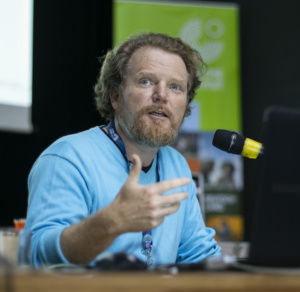
James Vaccaro, Triodos Bank
“If people feel they cannot be seen by anyone else it brings out the worst in them. If they feel part of a community, this brings out the best in them.”
James Vaccaro, Special Advisor at Triodos Bank
In business, the value of stakeholder engagement is often not fully appreciated. The results of such engagement usually only become visible in the mid to long term. When we consider social and environmental impact as part of business, we need the long-term support of our stakeholders.
Recognizing the role we play in the wider system and in our industry can make what we do much more powerful. There are three levels in which we see community play an essential role in supporting business in the wellbeing economy:
Genuine and balanced supplier relationships
Suppliers form one of the three most pivotal relationships we have at work alongside customers and colleagues. Yet how often do we think of them as part of our community? How balanced is the relationship we have with them?
It might be the case that our suppliers are larger and more powerful than us or vice versa. Regardless of which way around it is, genuine and balanced relationships can be forged if businesses go beyond compliance to a deeper relationship of shared values.
Often it is easier just to tick a box, but we have seen that the most forward thinking businesses go deeper to cultivate relationships based on shared values…and why wouldn’t they?
Building relationships with suppliers around a shared purpose and with similar value sets can increase reliability and simplify collaboration.
As the economic systems begin to transform, will we only be able to succeed by treating suppliers as a vital part of our community.
 “Ultimately the boundaries around organizations will become less fluid. What we will see will resemble an organizational ecosystem rather than large organizations.”
“Ultimately the boundaries around organizations will become less fluid. What we will see will resemble an organizational ecosystem rather than large organizations.”
Daniel Christian Wahl, author
Finding your place in the community
Often as a business, we choose to locate our offices and sites based on accessibility, tax rates and employee wages. But how much do we consider our relationship to the communities we are a part of?
Business can be a catalyst for exchanging knowledge and collaborating at the local and regional level, generating value in their location and beyond. Through working with other local stakeholders early on, a business will find how it can contribute to supporting a vibrant local area.

Rehema Isa, Womanomics
“We need collaborative creation processes to define and design together what wellbeing means in each organization and local context. We need access to spaces that allow us to be part of the change scenario and explore how we can contribute to the ecosystem.”
Rehema Isa, Womanomics
Depending on local conditions a businesses contribution could look different, for example: ensuring that employees get safely to their workplace and back home during a night shift or supporting local governments with education around waste management and recycling.
Recognizing your role in the wider system
Being a pioneer is not easy, but if we want to achieve change in our sector, we need the ability to recognize the potential that comes with forging a new path.
No matter if you work in the chocolate industry, banking, hospitality or reforestation, hearing how challenges were experienced and solved by other leaders can give us inspiration. Understanding where luck and human connection made a difference, gives us courage to take up the challenge of rethinking business as usual.
“We at Triodos are an important drop in the ocean, but we remain a drop in the ocean. Only if we recognize our place within the wider systemic spectrum can we really have an impact.“
James Vaccaro, Special Advisor at Triodos Bank
Many organizations that provide support to businesses have recognized the importance of communities of practice. Organizations like the Impact Hub have based their business model on the value they provide through an active community of support.
That’s why communities of practice provide great support to leaders and changemakers:
“We see ourselves as a provider of credit and capital. However we also provide value in being at the centre of a community and therefore play an important social function.“
James Vaccaro, Special Advisor at Triodos Bank
- Read a community case study here: Maroma: Embedded in the Community
- This is an extract from the forthcoming ‘The Business of Wellbeing – Alternatives to Business as Usual’ Guide, launching in January 2020. For more extracts, please click here
- To stay informed of the release of each extract, please sign up to our newsletter here.
the discussion?
Let us know what
you would like
to write about!
